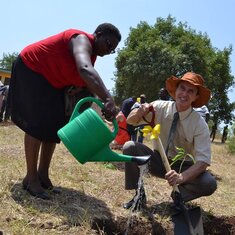Pagecontent
Uganda: Clean Water for Refugees
As a result of the conflict in South Sudan, Uganda has taken in more than 1 million refugees. In order to tackle this humanitarian challenge, the European Union has allocated 10 million euros from the European Union Emergency Trust Fund (EUTF) to a support programme for refugee settlements and host communities in Northern Uganda. The programme was officially launched in the end of February 2017. In addition to the Austrian Development Agency (ADA), the Belgian Development Agency (BTC) and a consortium of NGOs participate in the initiative, providing educational and social services to refugees and their host communities.
Helping people to help themselves
With 2.45 million euros of EU funding, ADA is joining hands with the Ugandan Ministry for Water and Environment (MWE) to build water supply systems and wastewater infrastructure. 70,000 people will directly benefit from this joint undertaking. "In this way, we are trying to help our partner country Uganda to shift from expensive emergency relief to sustainable infrastructure", explains Günter Engelits, Head of ADA's local office in Kampala. Other partners are managing the training and social service components of the programme. South Sudanese who were forced to flee will now have the opportunity to rebuild their lives in Uganda. "This is what most of them want. Especially young refugees are eager to take care of themselves", states Engelits.
Refuge in Uganda
"The 10 million euros provided by the EUTF are urgently needed here", emphasizes Engelits. "Since last summer, thousands of refugees from South Sudan are crossing into Uganda on a daily basis. So far, the country has taken in more than one million refugees." The situation is aggravated by the current drought: Roughly half of the people in Northern Uganda suffer from hunger. The Ugandan government has responded by providing free meals for schoolchildren in the affected areas.




